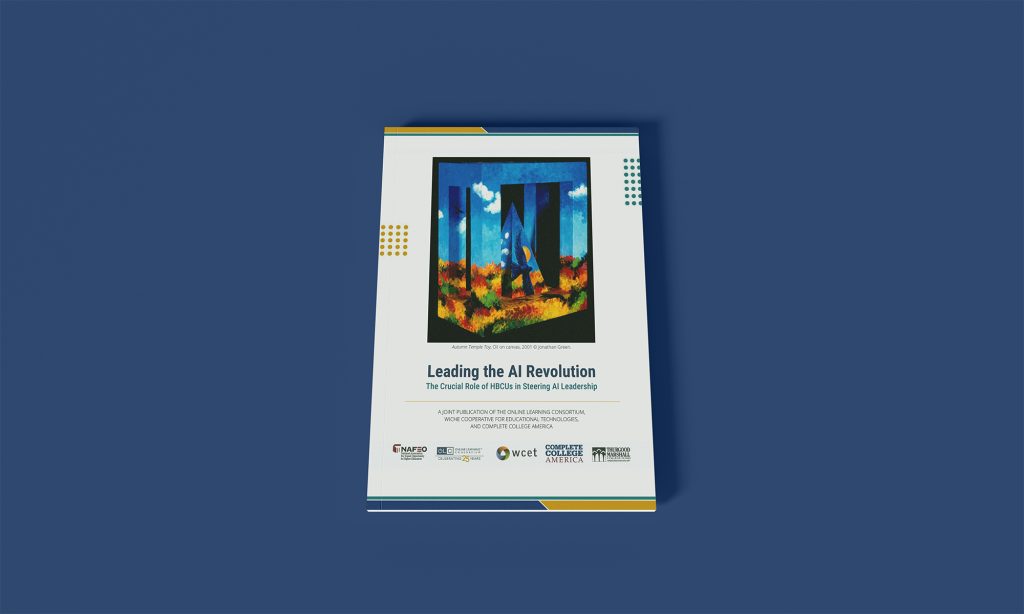Opened Culture (OEC), a pioneering collaboratory advancing academic innovation through the unique affordances of digital learning and open education, proudly announces its pivotal role in the creation of a transformative report, Leading the AI Revolution: The Crucial Role of HBCUs in Steering AI Leadership. This strategic document, published by the Online Learning Consortium (OLC), the Western Interstate Commission for Higher Education Cooperative for Educational Technologies (WCET), Complete College America (CCA), and featuring the contributions of a host of leaders from Historically Black Colleges and Universities (HBCUs), positions these institutions at the forefront of the artificial intelligence conversation in higher education.

Dr. Kim Cliett-Long, educator and cultural curator, and OLC board member emerita, emphasizes the collaborative spirit of the effort: “It was an incredible experience collaborating on the release of a groundbreaking report as a joint effort by the OLC, WCET, the National Association for Equal Opportunity in Higher Education (NAFEO), the Thurgood Marshall College Fund, Inc., and CCA. The expertise and dedication of the authors, along with contributions and thought leadership from numerous collaborators and HBCU students, provide a comprehensive and visionary blueprint for HBCUs to harness AI’s potential, fostering innovation and leadership within the Black community.”
This report not only showcases the potential of AI but also situates HBCUs as essential to ensuring its ethical and equitable usage. Dr. Cristi Ford, Vice President of Academic Affairs at D2L, notes the importance of this perspective: “This report is a critical step towards bridging the gap and fostering a more ethical future for AI. While bias in large languaging models is a recognized challenge, this report offers valuable, solution-oriented approaches for our industry to collectively address these issues, moving us beyond rhetoric and into action.”
Dr. Van Davis, Chief Strategy Officer of WCET, underscores Dr. Ford’s words, highlighting the unique position of HBCUs in shaping future technologies: “As artificial intelligence gains traction and increasingly impacts our daily lives, it’s critical that those systems be equitable, fair, and accurate. HBCUs are uniquely positioned to ensure that not only are our future AI systems equitable, but that everyone has the opportunity to benefit from this technology. It was an honor for WCET to work with these esteemed organizations on this report that highlights the role that HBCUs can play in the AI revolution.”

The report places significant emphasis on student voices, according to Meacie Fairfax, Strategy Director for CCA and Co-Lead of the CCA Council on Equitable AI, a community that is often excluded from the conversation: “Collaborations like this one that bring institutions, associations, and thought leaders together give us the ability to elevate voices in our community to orient us towards educational transformation. I was most proud of how we were able to center student voice within the report, featuring learners from HBCUs across the country validating the findings and calls to action alongside distinguished leaders from the HBCU community.”
Dr. Angela Gunder, CEO of OEC, reflects on the impact of the report as a positive force for change that confronts early skepticism and discomfort around AI’s place in education: “I was most delighted that in a time of apprehension and fear around the use of AI in the classroom, this report celebrated the goodness and the opportunity space in front of us, particularly with this moment as a time for collaboration and creativity. This appeared in every facet of the paper, including featuring the art of celebrated painter, Jonathan Green. His presence in the report allowed us to bring the community’s rich cultural heritage into an academic work that charts our path into the future. Knowing our history of resilience through word and artistic expression allows us to preserve our cultural traditions while we innovate for tomorrow.”

The report was designed not just as a theoretical exercise, but as a dynamic, actionable guide that senior leaders, educators, support staff, and students might use to work together effectively as a community. Dr. Beverly Robinson, a passionate HBCU advocate and author, underscores the key role of the report in paving the way for the future of education: “I am thrilled to collaborate with exceptional partners in launching this strategic road map for HBCUs and AI, propelling these institutions to the forefront of the AI conversation and enriching educational opportunities for underserved communities.”
Dr. Dylan Barth, Vice President of Innovation and Programs at the OLC, invites educators to engage with the report, regardless of whether they are at an HBCU or not: “Leading the AI Revolution highlights the important and innovative work of HBCUs that are charting a path for the effective and ethical use of AI. This report is a must-read for anyone in higher education who is serious about engaging with this burgeoning technology and preparing their students for the future. The OLC is thankful for our partnership with NAFEO, WCET, CCA, and TMCF, and for the many contributors to this publication.”

For those interested in learning more and getting involved with the work of this collaboration, the upcoming United Negro College Fund (UNCF) UNITE Summit for Black Higher Education July 28 – August 1, 2024 in Atlanta, GA will feature a fireside chat where Meacie Fairfax and Dr. Cristi Ford will delve into the paper’s findings and engage the community in discussion around the future of AI in education. Dr. Valora Richardson, Director of Digital Solutions and Innovation for UNCF and the leader of an AI symposium at the UNITE conference, highlights the report’s broad implications: “This guidebook is a crucial roadmap for HBCUs to lead in the AI revolution. It provides a comprehensive strategy for curriculum development, industry partnerships, and ethical leadership in AI. This resource will be invaluable in preparing our students for an AI-driven future while leveraging the unique strengths of HBCUs.”
Looking ahead, Dr. Gunder anticipates the next steps for OEC and for the collaborators on this project: “The energy amongst the team was electric from the moment that Kim assembled us into action with the idea for this initiative. In service to our shared commitment to the HBCU community, we don’t want to lose momentum for what’s next for our work together on setting the direction for the future of AI at our HBCUs and for the entire field of education. We’re looking forward to designing professional learning as our next step, featuring a curriculum full of practical applications and strategic guidance. Our hope is that these professional development offerings will provide HBCUs with direct support for implementing AI in empowering ways that prepare learners for the future of work and society.”

Call to Action: To further explore the transformative potential of AI in education and how HBCUs are leading the charge, download the report today from the OLC website. And for those attending the UNCF UNITE Conference, you are invited to join the session “Leading the AI Revolution: The Crucial Role of HBCUs in Steering AI Leadership,” on Monday, July 29, 2024, for a compelling discussion on shaping the future of AI in higher education with two of the contributors to the report, Meacie Fairfax and Cristi Ford.

